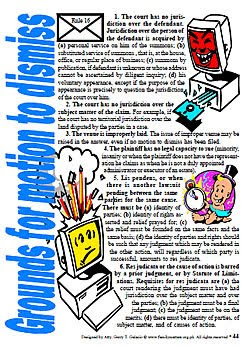 Note: Please surf to the complete list of available PDFs on legal procedures in criminal and civil cases.
Note: Please surf to the complete list of available PDFs on legal procedures in criminal and civil cases.
[1] A motion to dismiss is a prohibited pleading with cases falling under the Rule on Summary Procedure. In some instances, judges require the defendant to file an Answer instead of a motion to dismiss even if the case does not fall under Summary Procedure. In either case, the Answer can contain the grounds for a motion to dismiss as affirmative defenses.
[2] If the court grants the motion to dismiss, the complaint is dismissed. Subject to appeal, an order granting the motion to dismiss based on paragraphs g, h and i of Section 1, Rule 16 prevents the refiling of the same action or claim.
[3] If the court denies the motion to dismiss, the defendant can proceed to file an answer within the balance of the fifteen (15) day period to which he was entitled at the time of the serving of his motion but not less than five (5) days in any event, computed from his receipt of the notice of denial.
The defendant may also file a petition for certiorari or prohibition on the grounds of grave abuse of discretion, or the court’s lack or excess of jurisdiction.
Rule 16 Motion To Dismiss
SECTION 1. Grounds.—Within the time for but before filing the answer to the complaint or pleading asserting a claim, a motion to dismiss may be made on any of the following grounds:
(a) That the court has no jurisdiction over the person of the defending party;SEC. 2. Hearing of motion.—At the hearing of the motion, the parties shall submit their arguments on the questions of law and their evidence on the questions of fact involved except those not available at that time. Should the case go to trial, the evidence presented during the hearing shall automatically be part of the evidence of the party presenting the same. (n)
(b) That the court has no jurisdiction over the subject matter of the claim;
(c) That venue is improperly laid;
(d) That the plaintiff has no legal capacity to sue;
(e) That there is another action pending between the same parties for the same cause;
(f) That the cause of action is barred by a prior judgment or by the statute of limitations;
(g) That the pleading asserting the claim states no cause of action;
(h) That the claim or demand set forth in the plaintiff’s pleading has been paid, waived, abandoned, or otherwise extinguished;
(i) That the claim on which the action is founded is unenforceable under the provisions of the statute of frauds; and
(j) That a condition precedent for filing the claim has not been complied with. (1a)
SEC. 3. Resolution of motion.—After the hearing, the court may dismiss the action or claim, deny the motion, or order the amendment of the pleading.
The court shall not defer the resolution of the motion for the reason that the ground relied upon is not indubitable.
In every case, the resolution shall state clearly and distinctly the reasons therefor. (3a)
SEC. 4. Time to plead.—If the motion is denied, the movant shall file his answer within the balance of the period prescribed by Rule 11 to which he was entitled at the time of serving his motion, but not less than five (5) days in any event, computed from his receipt of the notice of the denial. If the pleading is ordered to be amended, he shall file his answer within the period prescribed by Rule 11 counted from service of the amended pleading, unless the court provides a longer period. (4a)
SEC. 5. Effect of dismissal.—Subject to the right of appeal, an order granting a motion to dismiss based on paragraphs (f), (h) and (i) of section 1 hereof shall bar the refiling of the same action or claim. (n)
SEC. 6. Pleading grounds as affirmative defenses.—If no motion to dismiss has been filed, any of the grounds for dismissal provided for in this Rule may be pleaded as an affirmative defense in the answer and, in the discretion of the court, a preliminary hearing may be had thereon as if a motion to dismiss had been filed. (5a)
The dismissal of the complaint under this section shall be without prejudice to the prosecution in the same or separate action of a counterclaim pleaded in the answer. (n)
Rule 17 Dismissal Of Actions
SECTION 1. Dismissal upon notice by plaintiff.—A complaint may be dismissed by the plaintiff by filing a notice of dismissal at any time before service of the answer or of a motion for summary judgment. Upon such notice being filed, the court shall issue an order confirming the dismissal. Unless otherwise stated in the notice, the dismissal is without prejudice, except that a notice operates as an adjudication upon the merits when filed by a plaintiff who has once dismissed in a competent court an action based on or including the same claim. (1a)
SEC. 2. Dismissal upon motion of plaintiff.—Except as provided in the preceding section, a complaint shall not be dismissed at the plaintiff’s instance save upon approval of the court and upon such terms and conditions as the court deems proper. If a counterclaim has been pleaded by a defendant prior to the service upon him of the plaintiff’s motion for dismissal, the dismissal shall be limited to the complaint. The dismissal shall be without prejudice to the right of the defendant to prosecute his counterclaim in a separate action unless within fifteen (15) days from notice of the motion he manifests his preference to have his counterclaim resolved in the same action. Unless otherwise specified in the order, a dismissal under this paragraph shall be without prejudice. A class suit shall not be dismissed or compromised without the approval of the court. (2a)
SEC. 3. Dismissal due to fault of plaintiff.—If, for no justifiable cause, the plaintiff fails to appear on the date of the presentation of his evidence in chief on the complaint, or to prosecute his action for an unreasonable length of time, or to comply with these Rules or any order of the court, the complaint may be dismissed upon motion of the defendant or upon the court’s own motion, without prejudice to the right of the defendant to prosecute his counterclaim in the same or in a separate action. This dismissal shall have the effect of an adjudication upon the merits, unless otherwise declared by the court. (3a)
SEC. 4. Dismissal of counterclaim, cross-claim, or third-party complaint.—The provisions of this Rule shall apply. to the dismissal of any counterclaim, cross-claim, or third-party complaint. A voluntary dismissal by the claimant by notice as in section 1 of this Rule, shall be made before a responsive pleading or a motion for summary judgment is served or, if there is none, before the introduction of evidence at the trial or hearing. (4n)







